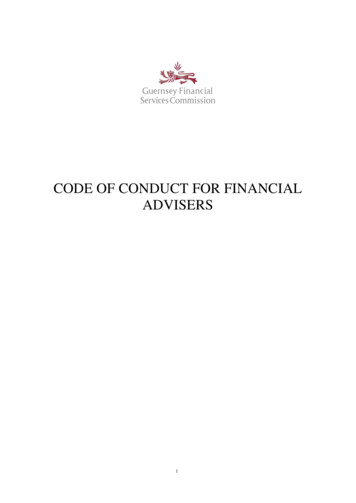
Transcription
CODE OF CONDUCT FOR FINANCIALADVISERS1
The Code of Conduct for Financial AdvisersContentsThe Principles of Conduct of Finance Business . 31.Introduction . 52.Interpretation . 63.General principles . 84.Assessing suitability . 95.Product research and recommendation . 106.Post inception principles . 127.Additional principles for long term insurance business. 128.Breaches . 132
The Principles of Conduct of Finance Business1.IntegrityA licensee should observe high standards of integrity and fair dealing in the conduct of its business.2.Skill, Care and DiligenceA licensee should act with due skill, care and diligence towards its customers and counterparties.3.Conflicts of InterestA licensee should either avoid any conflict of interest arising or, where a conflict arises, should ensure fairtreatment to all its customers by disclosure, internal rules of confidentiality, declining to act, or otherwise. Alicensee should not unfairly place its interests above those of its customers and, where a properly informedcustomer would reasonably expect that the firm would place his interests above its own, the firm should liveup to that expectation.4.Information about CustomersA licensee should seek from customers it advises or for whom it exercises discretion any information abouttheir circumstances and investment objectives which might reasonably be expected to be relevant in enablingit to fulfil its responsibilities to them.5.Information for CustomersA licensee should take reasonable steps to give a customer it advises, in a comprehensible and timely way,any information needed to enable him to make a balanced and informed decision. A licensee shouldsimilarly be ready to provide a customer with a full and fair account of the fulfilment of its responsibilities tohim.6.Customer AssetsWhere a licensee has control of or is otherwise responsible for assets belonging to a customer which it isrequired to safeguard, it should arrange proper protection for them, by way of segregation and identificationof those assets or otherwise, in accordance with the responsibility it has accepted.7.Market PracticeA licensee should observe high standards of market conduct, and should also comply with any code ofstandard as in force from time to time and issued or approved by the Commission.8.Financial ResourcesA licensee should ensure that it maintains adequate financial resources to meet its finance businesscommitments and to withstand the risks to which its business is subject.3
9.Internal OrganisationA licensee should organise and control its internal affairs in a responsible manner, keeping proper records,and where the firm employs staff or is responsible for the conduct of finance business by others, should haveadequate arrangements to ensure that they are suitable, adequately trained and properly supervised and that ithas well-defined compliance procedures.10.Relations with Guernsey Financial Services CommissionA licensee should deal with the Commission in an open and co-operative manner and keep the regulatorpromptly informed of anything concerning the firm which might reasonably be expected to be disclosed to it.4
1. Introduction1.1. The Commerce and Employment Department requested the Commission to implement theGuernsey Financial Advice Standards to be effective from 1 January 2015. These standards applyto investment licensee employees advising retail clients on controlled investments and alsoauthorised insurance representatives providing advice to retail clients on long term insuranceproducts; these employees are collectively termed financial advisers.1.2. The objective in setting out this document is to establish a recognised standard of professionalconduct with which financial advisers are expected to comply in the carrying out of their longterm insurance business.1.3. The terms herein are an extension of the Principles of Conduct of Finance Business, which wereissued by the Commission in February 1991. The Principles of Conduct of Finance Business mustbe observed by financial advisers at all times.1.4. The requirements herein shall only apply when a financial adviser is providing advice on longterm insurance products to a client classified as a retail client as defined in the InsuranceIntermediaries (Conduct of Business Rules) 2014 (“the Intermediary Rules”)1.5. The standards herein shall not apply;(a)for the provision of advice to a client classified as a professional client or an eligiblecounterparty,(b)for the provision of services to execution only clients,(c)for a transaction entered into solely as a result of the client responding to an ‘off-thepage’ advertisement, or(d)for the issuing of periodical publications containing recommendations as to theacquisition, retention or disposal of investments of any kind.1.6. Acts of gross negligence or repeated acts of negligence may amount to unprofessional conductand may be investigated by the Commission. Nevertheless, claims against financial advisers andtheir licensee for compensation arising from acts or omissions amounting to negligence arematters for determination by the Courts.1.7. The requirements herein are designed to be complied with by all financial advisers advising onlong term insurance products in or from within the Bailiwick of Guernsey.5
2. InterpretationFor the purposes of this code:“advertisement” means every form of advertising, whether in a publication or by the display ofnotices or by means of circulars or other documents or by an exhibition of photographs orcinematograph films or by way of sound broadcasting, television or any other electronic media,and advertising shall be construed accordingly;“attitude to investment risk” means the investment risk a client is willing and able to accept toachieve their financial goals taking into consideration the client’s capacity for loss;“authorised insurance representative” means an individual authorised in accordance with section 16of the Law;“Board” has the meaning given to it by section 133 of the Companies (Guernsey) Law, 2008, asamended or, in the case of an unincorporated entity, the committee or managing board of apartnership or other similar governing body;“capacity for loss” means the financial loss a client could tolerate without a detrimental effect totheir standard of living at the date of investment or inception of the policy;“the Commission” means the Guernsey Financial Services Commission;“eligible counterparty” is considered in Rule 7 of the Intermediary Rules;“employee” in relation to a person, means an individual who is employed in connection with alicensee’s long term insurance business in Guernsey whether under a contract of service or forservices or otherwise;“financial adviser” means an authorised insurance representative authorised by a licensee to giveadvice to retail clients on long term insurance products;“insurance intermediary business” means performing any of the activities defined in section 2(5)of the Law;“the Law” means the Insurance Managers and Insurance Intermediaries (Bailiwick of Guernsey)Law, 2002, as amended;“licensee” means the holder of a licence to carry on insurance intermediary business issuedunder the Law;“long term insurance business” means performing any of the activities defined in section 2(5) of theLaw in relation to long term insurance products;“long term insurance product” means any policy or product falling under schedule 1 of the Law,excluding permanent health, credit life assurance and any contracts on human life that arerenewable annually;6
“other relevant legislation or standards” means any legislation or enactment enacted to enable theCommission to supervise the carrying on of insurance intermediary business. Other standardsinclude codes or standards (however described) of professional bodies that financial advisers maybelong to, for example, the Chartered Insurance Institute;“professional client” is considered in Rule 7 of the Intermediary Rules;“retail client” is considered in Rule 7 of the Intermediary Rules;“shortfall provisions” means that where a policyholder exercises his right to cancel a contract hemay not get a full refund of the money he has paid if the value of the investment falls before thecancellation notice is received by the insurer.7
3. General principles3.1. Financial advisers must be authorised by the licensee by whom they are employed and onlyauthorised financial advisers may advise retail clients on specified long term insurance productsin or from the Bailiwick of Guernsey.3.2. A person shall not use the term “financial adviser” unless authorised to do so by an entityappropriately licensed by the Commission.3.3. No standards can be exhaustive in all circumstances. In areas where the terms herein are notspecific, financial advisers should be guided by the Principles of Conduct of Finance Businessand the underlying spirit of these requirements.3.4. Lack of mention herein of a particular act or omission shall not be taken as indication that such anact or omission constitutes acceptable professional conduct.3.5. A financial adviser shall:(a)comply with all applicable laws, enactments, regulations, rules, codes, guidance,principles and instructions when dealing with clients;(b)in the conduct of his business, provide advice objectively and not act in any way whichis contrary to the terms herein or any other relevant legislation or standards;(c)whenever possible, make an appointment before visiting a client;(d)where unsolicited calls are unavoidable, yet deemed to be in the client’s best interests,ensure that they are made at an hour likely to be convenient to the client; and(e)when making unsolicited contact with prospective clients, for the purpose of marketingor advising on long-term insurance products, the financial adviser shall identifyhimself at the start of the call and explain the genuine purpose of the call. The purposeof the call should be to discuss the prospective client’s financial arrangements and notto sell specific products.3.6. Prior to providing advisory services to a client, a financial adviser shall:(a)make it known that he represents a regulated entity which assumes responsibility forhis conduct while advising clients on financial matters;(b)disclose to the client in writing the classes of products upon which he is authorised toprovide advice, his qualifications and his professional experience;(c)disclose to the client in writing the range, scope and any limitations in the productproviders and/or products upon which he is able to provide advice;(d)fully explain to the client any involvement in conditional selling;(e)ensure that he has sufficient knowledge of the legislation affecting the client includingtaxation. If he is unable to advise a client then he should inform the client and, if8
possible, refer the client to a person who can give him appropriate advice;(f)give advice only on those matters in which he is competent and shall seek orrecommend specialist advice where necessary;(g)not use or disclose any information acquired from his clients except in the normalcourse of negotiating, maintaining, renewing, encashing or surrendering a policy, or inhandling a claim for a client, unless the written consent of the client has been obtainedbeforehand or disclosure of the information is required in the public interest or iscompelled by law;(h)not inform the client that his name has been provided by another person without thatperson’s consent, and shall disclose that person’s name if requested to do so by theclient; and(i)inform the client of any ongoing services provided by the licensee and shall disclose tothe client in writing all fees and charges for providing those services.4. Assessing suitability4.1. Prior to recommending a long term insurance product (or any material change to an existinglong term insurance product including cancellation), the financial adviser shall:(a)obtain and record sufficient knowledge of the client’s personal and financialcircumstances and understanding of their objectives to ensure that any advice issuitable to the needs, wishes and financial position of the client;(b)assess the knowledge and experience of the client in relation to financial matters.The client should be classified as either a retail client, professional client or aneligible counterparty and the client informed of their classification in writing. Theclient should also be informed of the effect of this classification and if it reducesany protection available to them;(c)make a documented assessment of the client’s attitude to investment risk. In theevent of a recommendation to be made in joint names, a separate assessment shouldbe made of each person and a documented decision made with the clients for anoverall attitude to investment risk;(d)make a documented assessment of the affordability of the funds to be invested bythe client and of the client’s capacity for loss; and(e)maintain evidence on each client’s file of product research carried out, includingbut not limited to quotations, illustrations and comparisons unless the licenseemaintains a Board or committee approved “white list”.9
5. Product research and recommendation5.1. A financial adviser shall:(a)not advise a client to convert, allow to lapse, cancel or surrender any product unlesshe can demonstrate the action to be in the best interests of the client. If such actionis advised then the reasoning should be fully documented in the written adviceprovided to the client;(b)not make comparisons with any other types of policies unless he clarifies thediffering characteristics of each policy;(c)not make inaccurate or unfair criticisms of any financial institution;(d)not withhold any written evidence or documentation relating to the product fromthe client;(e)if using illustrations, projections and forecasts supplied by a provider, ensure thatthe client is provided with all relevant documentation that has been supplied;(f)ensure that all illustrations, projections and forecasts are relevant to the specificcountry where the client is resident and if they are not, explain the differences; and(g)use his judgement objectively in the best interests of his clients where a choice ofprovider is available to the financial adviser;5.2. Prior to the inception (or any other material change to a long term insurance product includingcancellation) of a long term insurance product, and in order to assist the client in making aninformed decision, a financial adviser shall provide the client with written advice, which mustinclude as a minimum:(a)a recommendation setting out in plain language what product is beingrecommended, how it meets the client’s needs, wishes and financial position andwhy it is favourable over any other products considered;(b)the principal terms of any product recommended by him;(c)an explanation of the key risks associated with the product being recommended. Itis not sufficient to rely on provider literature for this purpose;(d)in the case of products where the investment return is not guaranteed, explain that itis not guaranteed. Where a product purports to be guaranteed, explain anyconditions or limitations applying to the guarantee;(e)an explanation, where applicable, of the different surrender values that may beavailable over the term of the policy, including a warning that surrender practicemay vary from time to time;(f)warnings of the possible penalties of early surrender, whether at the choice of theclient or through their death. Where a terminal bonus may be payable, emphasise10
that the product will normally have to run its full term before the bonus becomespayable;(g)details of any cooling off period relating to the particular product beingrecommended and an explanation that there will be an opportunity for the client tocancel or withdraw from the contract and set out the period during which he will beable to exercise this option. Any shortfall provisions should also be explained atthis time;(h)disclosure to the client of the extent of research carried out, including the names ofthe providers and products considered;(i)full and frank disclosure of any matter which may affect the client’s decisions;(j)an explanation to the client of the amount of remuneration that the licensee willreceive as a result of the sale or variation of each product recommended, and anexplanation of any and all charges (including bid-offer spread charges andcancellation charges) that will or may be incurred both at inception and the ongoingcharges during the life of the product. If the amounts are not known, then the basisof calculation shall be provided; and(k)where applicable, explain that deductions are made to cover the cost of life cover,commission, expenses, surrender penalties and other charges.5.3. After providing a client with a written recommendation, a financial adviser shall:(a)afford the client reasonable time to consider the written advice prior to the clientmaking a decision to accept the recommendation;(b)ensure as far as possible that when a client is completing an application form or anyother document, that all material facts are accurately and properly disclosed,making it clear to the client that all answers or statements are the client’s ownresponsibility. If the financial adviser completes the proposal form on behalf of theclient then the client must be asked to check the details before signing the form andbe provided adequate opportunity to do so; and(c)inform the client of the name of each provider with whom a contract is placed. Thisinformation shall be given whenever possible prior to the inception of the productand any changes thereafter shall be advised at the earliest opportunity to the client.11
6. Post inception principles6.1. Following the inception of a long term insurance product, the financial adviser shall as soonas reasonably practicable:(a)ensure that any confirmation of investment, certificates or evidence of cover andthe basis of payments are provided to the client at inception and again on anyrenewal or as soon as is reasonably practicable; and(b)have proper regard for the wishes of a client who seeks to terminate any agreement.7. Additional principles for long term insurance business7.1. For the purpose of selling insurance, the financial adviser shall not use or disclose anyinformation acquired from any record of the licensed insurer or licensed insuranceintermediary or a related party of any of the above, obtained for a purpose other than onespecifically designed in connection with the provision of insurance by that licensed insurer orlicensed insurance intermediary unless with the written permission of the client.7.2. Prior to the inception (or any other material change to a product including cancellation) of theproduct, the financial adviser shall:(a)inform the client that non-disclosure of material facts or the inclusion of incorrectinformation may result, inter alia, in a claim being repudiated or policy avoidance.(b)where applicable, explain to the client the consequences of missed premiums;(c)on request, provide the client with a copy of the proposal form or any other relevantdocumentation; and(d)if in receipt of policy monies which need to be passed on to an insurer, keep aproper account of all financial transactions with a client and acknowledge receipt, ifrequested, of any monies received. Any such monies must be remitted in strictconformity with any agreement that exists between the insurance representative andthe licensee.7.3. In respect of a claim or incident, a financial adviser shall:(a)inform the insurer without delay if the client advises him of an incident that mightgive rise to a claim;(b)give prompt advice to the client of the insurer’s requirements concerning the claim,including details of the information required to establish the nature and extent ofthe loss;(c)pass information received from the client to the insurers without unreasonabledelay; and(d)pass on to their licensee all information regarding claims or incidents which mightgive rise to claims, and give reasonable assistance to the client in pursuing a claim.12
8. BreachesIf a financial adviser breaches any part of the terms herein he must immediately inform the licensee bywhom he is employed.13
Financial advisers must be authorised by the licensee by whom they are employed and only authorised financial advisers may advise retail clients on specified long term insurance products in or from the Bailiwick of Guernsey. 3.2. A person shall not use the term "financial adviser" unless authorised to do so by an entity











